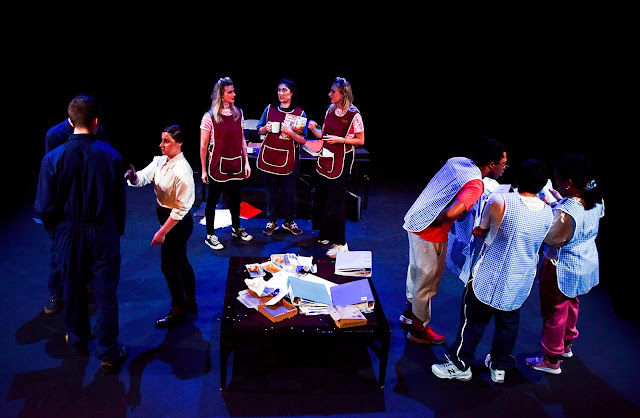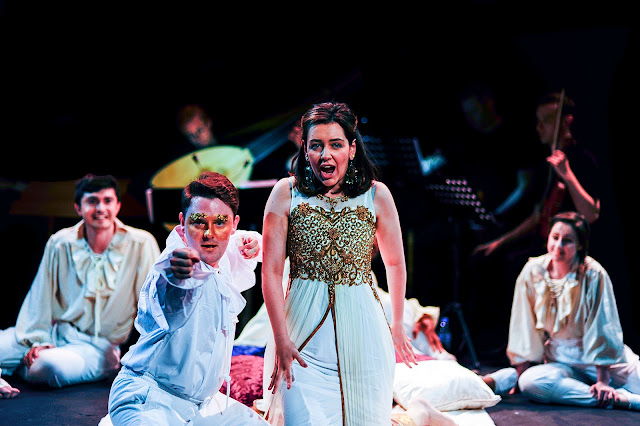 |
| Purcell: Dido & Aeneas - Katey Rylands, Sonny Fielding - HGO (Photo Laurent Compagnon) |
Blow: Venus & Adonis, Purcell: Dido & Aeneas; Elizabeth Green, Conall O'Neill, Ralph Thomas Williams, Katey Rylands, Sonny Fielding, Julia Surette, Helen Cooke, dir: Jessica Dalton, cond: Seb Gillot; HGO at the Cockpit
An imaginative updating of the two 17th century English classics with a very fine young cast.
Henry Purcell was John Blow's pupil and the two were friends as well as colleagues. It has long been accepted that Purcell's opera Dido and Aeneas was influenced by Blow's Venus and Adonis. The two works being the earliest surviving English language operas, as well as some of the greatest. Recent scholarship has shown other intriguing links between them. Venus and Adonis was written for performance at the court of King Charles II, whilst the only known performance of Dido and Aeneas was at Josiah Priest's school for young ladies in Chelsea. It has long been postulated that there was an earlier grander performance of Dido and Aeneas, and we now know that Venus and Adonis was also performed at Josiah Priest's school, suggesting clear links between court performance and the school.
These experiments in English opera seem not to have been a great success, we have to wait until the early 18th century for further major English works. Blow wrote no more opera, and Purcell's other large-scale stage work are in the awkward semi-opera vein. Whilst the two works might seem an obvious double bill, they are rarely played together.
 |
| Blow: Venus & Adonis - Elizabeth Green, Conall O'Neill - HGO (Photo Laurent Compagnon) |
It was a delight to find HGO performing Blow's Venus and Adonis and Purcell's Dido and Aeneas as a double bill at the Cockpit and we caught the opening night on 20 May 2022. Both operas were directed and designed by Jessica Dalton and directed from the harpsichord by Seb Gillot. Elizabeth Green and Conall O'Neill were Venus and Adonis with Ralph Thomas Williams as Cupid. Katey Rylands and Sonny Fielding were Dido and Aeneas with Julia Surette as Belinda and Helena Cooke as the Sorceress.
Seb Gillott directed the seven instrument period ensemble at the rear of the stage with the action taking place in front of them. Settings were suggested with an economical use of props, manipulated by the hard-working chorus. Dido and Aeneas was completely modern dress, whereas for Venus and Adonis we began in modern dress but moved into an evocation of ancient times. Whilst both operas were finely performed, Dido and Aeneas seemed to be far more stylistically confident, whether because of the use of modern dress (no awkward factor of getting comfortable in a tunic), or because Dido and Aeneas is the far more familiar piece or perhaps, dare we say it, because Dido and Aeneas is the better stage work.
Venus and Adonis is astonishing, but it is a slightly strange piece, far closer to the masque with its interleaving of serious and comic, and extensive use of dance. Dalton began the work in modern dress with Ralph Thomas Williams' Cupid (a counter-tenor singing a role originally written for a child, Lady Mary Tudor, Charles II's daughter by actress Moll Davies who played Venus) running a modern dating app. However after this first scene, we moved into a slightly awkward evocation of ancient times (perhaps), with Cupid and the little cupids (played by the chorus) dressed in vaguely 17th century dress.
Thankfully the performances of Elizabeth Green and Conall O'Neill transcended this, with Green as a strong Venus who rose to heights in her astonishing final scene. O'Neill brought maturity and darkness of voice to Adonis, making him stronger than usual. As Cupid, Ralph Thomas Williams managed to avoid much of the awkwardness of an adult man playing a role intended as a cute child, though the comedy was less pointed than usual. The chorus, doubling as shepherds and cupids, were hard working including giving us a number of danced numbers (choreography Kate Goldie Cheetham) though the fact that music director Seb Gillot was behind the action led to some unsteadiness of ensemble.
 |
| Purcell: Dido & Aeneas - The witches - HGO (Photo Laurent Compagnon) |
Overall, I would have liked more words. The opera is not that familiar, and much of the comedy relies on verbal dexterity and despite some fine singing, this did not always come over.
Dido seemed to be being presented as the CEO of a modern company, with Aeneas as an unspecified and not very heroic visitor. In an imaginative touch the witches were the cleaners, unregarded yet able to affect the lives of the great and good. The result worked very well indeed and the overall concept came over as a highly imaginative solution to the work's problems (and for all its greatness, there are problems).
Katey Rylands was a finely melancholic Dido, depressed and anxious from the outset she sang with a bright, finely lyric tones, focussed and flexible. Rylands' Dido very rarely allowed herself to be happy, and the moments of joy with Sonny Fielding's engagingly bear-like Aeneas were rare. Rylands' final scene was haunting and beautifully touching, though it was perhaps a mistake for it to be sung to an empty stage, surely Dido's aria is a farewell to her courtiers. Fielding (a tenor) sang Aeneas with a soft-grained, subtle feel and hardly any bluster.
As Belinda (also singing the music for the first lady), Julia Surette was a wonderfully managing PA, bouncing her boss into a relationship. Surette impressed both with her style and the confidence of her characterisation. Similarly impressive was Helena Cooke as the evil cleaning lady, wisely avoiding any tendency to funny voices yet radiating malevolence.
These principals were supported by a fine group of singers in the small roles. Olivia Carrell and Abbie Ward as delightfully malevolent witch twins, Isabelle Haile as a highly confident second lady, Hannah Savignon-Smythe as the spirit in a wonderful scene where she moved from bolshie but silent servant to imperious (fake) spirit of the gods. Matthew Secombe sang finely as the sailor, again avoiding silly accents.
 |
| Blow: Venus & Adonis - Ralph Thomas Williams, Elizabeth Green - HGO (Photo Laurent Compagnon) |
In the 'pit' Seb Gillott and his band impressed greatly in both operas, and it was their important musical contributions that lifted both works. Crisp and engaging dance music, expressively touching melancholy and much else besides. We had two violins, viola, bass violin, theorbo/baroque guitar, oboe/recorder and harpsichord (and tambourine at one point), seven performers making a very strong impression indeed.
Never miss out on future posts by following us
The blog is free, but I'd be delighted if you were to show your appreciation by buying me a coffee.
Elsewhere on this blog
- Rediscovering the joys of playing together: Noemi Gyori & Gergely Madaras their disc of flute duets - interview
- Magical places: Sam Cave's Refracted Resonance explores contemporary music for classical guitar - record review
- Shining Shore: The Music of Early America a delightful disc from Three Notch'd Road: The Virginia Baroque Ensemble - record review
- The lakeside theatre returns: I chat to Kirsty Hopkins, artistic director of West Green House Opera, about the company's plans - interview
- The TRUMPETS shall sound! FANFARE 250 for the Fine City of Norwich - concert review
- Art and Music at Sheffield Chamber Music Festival - concert review
- Vividly present playing & discreet virtuosity: Ensemble 360 at the launch of Music in the Round's 2022 Sheffield Chamber Music Festival - concert review
- Unique in the Canadian cultural landscape: conductor Mark Vuorinen on the Elora Singers - interview
- The Earth Moves: The Tallis Scholars in Antoine Brumel and David Lang - concert review
- Samuel Barber: The Complete Songs, Dylan Perez & friends survey nearly 50 years of the composer's songs including those unpublished during his lifetime - record review
- Boulevard des Italiens: tenor Benjamin Bernheim explores Paris' long love-affair with French composers - record review
- Winds of Change: a survey of Ruth Gipps' wind chamber music from 1943 through to 1995 - record review
- A gift to a composer, to be involved in the festival in a more integral way: Helen Grime talks about being Sheffield Chamber Music Festival's first guest festival curator - interview
- Home











No comments:
Post a Comment